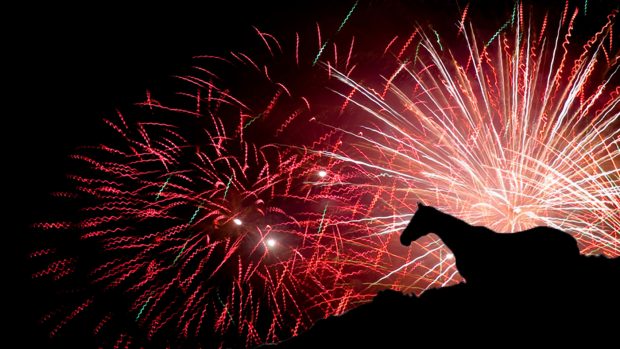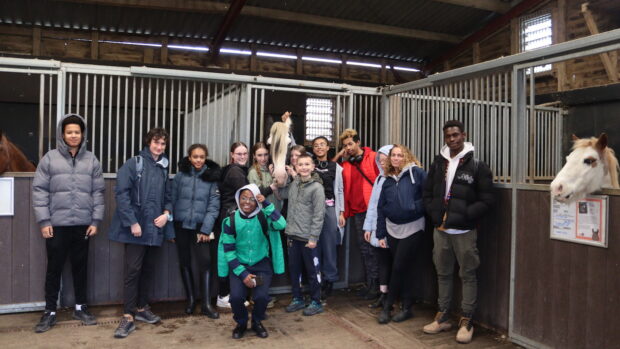An equestrian photographer has spoken out about the “huge problem” of copyright theft of images, which he fears has become “socially acceptable”.
Rob Bayes, who works in the south west, said competitors taking images from photographer’s websites to share on social media was “on the increase”.
He said it was also common for riders to flagrantly steal images by taking phone snaps of the on-site screens in photographers’ stands.
“It hits us in the pocket, but it’s not just a financial issue,” he said. “If you’ve spent 11 hours in an arena and perhaps more time adjusting and uploading images, you don’t want to see a blurry phone snap with your work appearing on Facebook.”
The law states that photographers retain the copyright to all images they have taken, even if you have bought a hard copy.
Anyone who directly or indirectly copies a photographer’s image or reproduces it could theoretically face fines of up to £50,000 — although smaller claims to cover the cost of the “stolen” image are more probable.
While it is both difficult — and time-consuming — for photographers to police Facebook, many are having to tackle the issue head on.
“Sometimes I get tipped off by other customers,” said Rob. “Facebook’s only mechanism of reporting a problem is via the image itself, and you can’t always access it because of privacy settings.
“Your other options are to send the offender a message saying ‘please don’t do this’ — which some will ignore and some won’t — or go down the legal action route.
“You have a strong case to get your money back, but it doesn’t build good relationships with customers. People might not want to do business with you if you’re the nasty guy that fined their friend £500.”
Article continues below…
You might also be interested in:

Creative photographer captures horses in new light
Under-Horse, by photographer Andrius Burba, pictures horses from

Budding photographer? 6 tips to take brilliant photos of horses
Photographer Emma Drabble gives her top tips for

Photographing dressage horses: how to show your horse off to the max
We can't all be Kevin Sparrows of this
Peter Martin-Turner of event photographers Spidge agreed the problem was a contentious one.
“It’s not only rude and irritating, but it undermines the income stream of the photographer,” he said. “We incur costs attending horse shows, are very seldom paid expenses to be there by the organisers and more commonly are asked for either trade stand fees or commission sponsorship, so attendance is speculative.
“Combine this with long hours, expensive kit to obtain decent images and often inclement weather you have a triple whammy.”
Peter added that the company had tried to take a “reasoned” approach the problem, engaging competitors in dialogue rather than pursuing legal redress.
“We have found we have gathered a groundswell of support in this way to the point that it has become a stigma to display blatantly watermarked and unpaid for images.
“Riders are happy to report others who have taken images as they appreciate the value of a good equine event photographer attending their shows.”
Image theft, however, has prompted some sellers to go to more extreme lengths. Some event photographers have attempted to protect their property by having pictures available on-site only.
One southern photographer, who did not want to be named, said that he believed putting images on the web only created problems.
“Ten years ago when I first put pictures online, my sales dropped by 40% so I stopped it after a couple of months and I’ve stuck with that approach,” he said.
“We get people complaining that they can’t see them online, but to be honest it’s often the people who want to take the pics who are saying it. We’re determined to stick with this way and our sales have been increasing all the time.”
Two years ago, the David Broome Event Centre at Cricklands took an innovative approach by making their online proofs pay-to-view.
Customers have to pay £12.50 to get behind the paywall to see the images, but can then download all the high-resolution pictures of them at that event if they choose. Alternatively, they can claim the £12.50 back against the cost of a print.
“We did it in direct response to copyright theft,” said James Broome. “It was just so prevalent and people didn’t even know it was a crime. They see watermarked images all over Facebook and think of it as one of those ‘optional’ laws.”
The move initially met with mixed reactions, but has since become so successful that the Broomes are considering rolling out the system to other photographers.
“Most of the people who complained were ones who had never bought an image,” he added. “Really, people are getting an awful lot for their money.”





